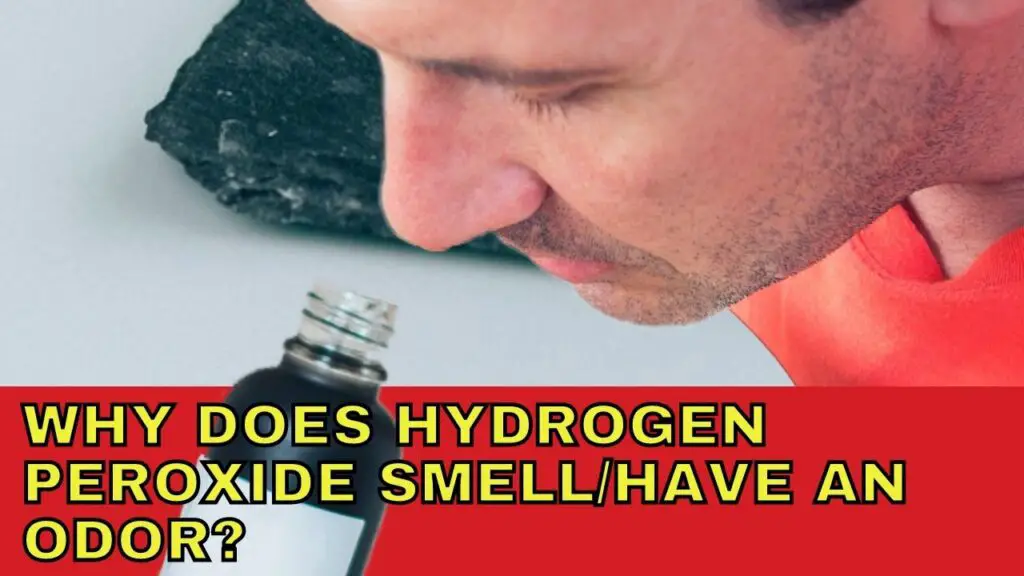From cleaning your home to whitening your teeth, hydrogen peroxide has many uses.
Hydrogen peroxide is an unstable compound that eventually breaks down into water (H20). You can find hydrogen peroxide in nature, diluted in water. It’s a natural disinfectant that is harmless to the surrounding environment.
However, in its purest form (made in labs), hydrogen peroxide becomes a lot more combustible. NASA uses lab-created, pure hydrogen peroxide as a component in rocket fuel.
Does All Hydrogen Peroxide Have an Odor?
No, not all types of hydrogen peroxide have a smell.
Pure hydrogen peroxide is a pale blue liquid that’s slightly more viscous than water, and has a strong odor. Diluted hydrogen peroxide, commonly used around the home or in health and beauty products, typically doesn’t have an odor.
The peroxide commonly available in stores is around 3% H202 and is diluted with plain water. Depending on the person and their sense of smell, it is reported to have a very mild acidic smell, a mild odor similar to bleach, or no smell whatsoever.
Why does Hydrogen Peroxide Smell?
Because hydrogen peroxide isn’t safe to consume, some manufacturers add denaturants (chemical substances containing ethyl alcohol that make it unfit to drink) to prevent human consumption, and additives to stabilize the hydrogen peroxide and prevent it from decomposing too quickly.
These denaturants and inhibitors may emit a foul smell. Another reason why hydrogen peroxide (H202) may have an odor is if it is very concentrated. In a very pure form, the normal decomposition of H202 could produce small amounts of O3, which is known to have a pungent odor.
What Does Hydrogen Peroxide Smell Like?
To most people, hydrogen peroxide with a concentration of 30% or below doesn’t have an odor. The more concentrated the hydrogen peroxide, the more obvious the smell. At high concentrations, hydrogen peroxide has a slightly sharp, pungent scent or an acidic smell similar to nitric acid.
The exact smell is hard to describe and seems to vary from person to person. Some liken it to bleach, while others claim it’s more of an acidic smell. Generally speaking, hydrogen peroxide doesn’t have an over powerful smell unless it reacts with other substances.
Why Does Hydrogen Peroxide Smell On Skin?
When hydrogen peroxide is used on the skin, it produces a foul odor that only some people can smell. The reason behind this is that the hydrogen peroxide is reacting with other substances on your skin.
The higher the concentration of peroxide, the stronger the smell. It’s important to note that hydrogen peroxide should be thoroughly diluted before it is applied to the skin. As well as a foul odor, it can cause skin irritation, rashes, and painful blisters.
Why Does Peroxide Smell Like Vinegar?
Hydrogen peroxide, unless very concentrated, has little to no odor when it is in a bottle (or other form of packaging). That is, of course, until it reacts with other substances or oils.
If you use hydrogen peroxide to clean a sofa or on your skin, you may notice that it develops a pungent smell similar to vinegar. This occurs when the hydrogen peroxide (H202) reacts with oils, such as the oils on your skin caused by sweat.
When H202 reacts with these body oils, it creates a number of acids, such as aldehydes, ketones, and some organic acids. Vinegar itself is an organic acid known as acetic acid, hence the smell comparison between hydrogen peroxide and vinegar.
Hydrogen peroxide doesn’t only produce a bitter, vinegary smell when it comes into contact with skin. When used on sofas or other fabrics, hydrogen peroxide may oxidise natural oils present on the fabric into carboxylic acids such as acetic acid.
Why Does Peroxide Smell Like Feet?
Strong concentrations of hydrogen peroxide tend to have a relatively neutral smell (often likened to the scent of bleach) until the reaction between hydrogen peroxide and oils causes the breakdown of hydrogen peroxide into water and free oxygen.
The free oxygen produces O2, which tends to react strongly and cause oxidation. The result of the oxidation reaction may produce a strong odor.
The odor is described in different ways. For people, it smells like vinegar, and for others it smells like feet.
Interestingly, some people who experience foot odor may notice that their feet smell like vinegar. The smell is not caused by the sweat, but rather by the presence of propionibacteria that break down your sweat, producing propionic acid.
Since propionic acid is similar to acetic acid (vinegar), this could explain why some people report that hydrogen peroxide smells like feet.
